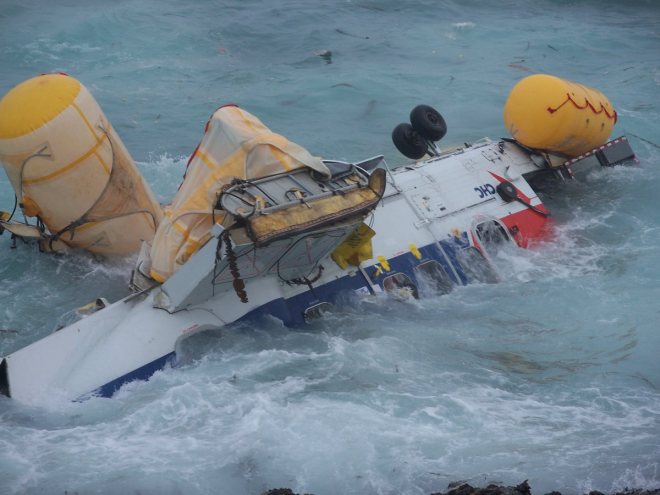Helicopter safety measures announced

Offshore helicopter flights will be prohibited if sea conditions are judged to be at their “most severe”.
The UK Civil Aviation Authority yesterday announced a series of measures to help improve safety of flights to and from North Sea installations.
It is hoped keeping a close eye on sea conditions could limit the chance of a helicopter capsizing if it is forced to ditch into the sea. It should also make rescue efforts easier if anything untoward happens.
The change follows several North Sea disasters involving helicopters in recent years – most recently the crash off Sumburgh last August which killed four people. The Super Puma aircraft rolled over after hitting the water at Garths Ness.
It also comes after calls were made last month for a full public inquiry into helicopter safety, as members of the House of Commons Transport Select Committee gathered evidence in Aberdeen.
Other measures being adopted mean passengers will only be able to fly if they are seated next to an emergency window exit to make it easier to get out of a helicopter in an emergency.
There are also calls for passengers to have better emergency breathing equipment which should increase underwater survival times.
There will be important changes to the way pilots are trained and checked. And the CAA says it will take on the role of approving each offshore heli-deck, ensuring they meet strict safety standards.
The changes are the result of a comprehensive review of offshore helicopter operations undertaken in conjunction with the Norwegian CAA and the European Aviation Safety Agency (EASA) and advised by a panel of independent experts.
Recommendations to EASA – as the regulator for helicopter certification and airworthiness – include enhancing the safety of helicopters and establishing a review of offshore helicopter accidents with national aviation organisations, such as the CAA, to highlight safety issues and develop remedies.
In the meantime, the CAA is expecting helicopter operators to make improvements to helicopters and survival equipment including:
• Fitting side floats;
• Implementing automatic flotation equipment;
• Adding hand holds next to push out windows;
• Improvements to life rafts and lifejackets.
In addition the Offshore Petroleum Industry Training Organisation (OPITO) is expected to improve survival training for offshore workers.
CAA chairwoman Deirdre Hutton said: “The safety of those who rely on offshore helicopter flights is our absolute priority.
“The steps we are announcing today will result in significant improvements in safety for those flying to and from offshore sites in the UK and potentially worldwide.
“We expect helicopter operators, the oil and gas industry and EASA to move forward with recommendations to them as soon as possible. For our part, the CAA is already taking forward actions directly under our control.
“We will monitor and report regularly on progress, so that people can have confidence that these important changes are being implemented as quickly as possible.”
In gathering evidence for the review the team engaged with trade unions representing industry workers and pilots, the oil and gas industry, helicopter operators, manufacturers, government, regulatory bodies and other experts in the field, as well as analysing available data and reports.
While each organisation will be accountable for implementing the recommendations under their control, the CAA will seek to establish and chair a new safety forum that will promote delivery of the recommendations and publicly report on progress.
Shetland MSP Tavish Scott welcomed the announcement, saying the safety of those using these flights should always be the number one priority.
Mr Scott said: Having previously undertaken offshore helicopter survival training myself, I can fully understand how these changes will be applauded by people across the industry, not least by those who use these flights to and from offshore sites on a regular basis.
“Hopefully helicopter operators across the industry can now iron out the practicalities of how these recommendations can be successfully implemented and move forward with them as soon as possible.”








NO COMMENTS
Add Your Comment